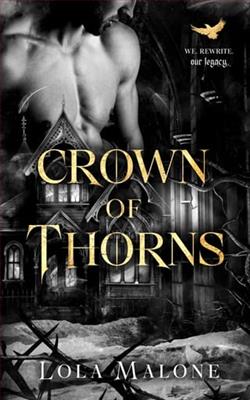Page 70 of The Sea-Mist Cottage Inn
For the most part, water is a harmless, healthy thing. We need it—a lot of it—to live. We use it to keep ourselves and our world clean. It’s refreshing. It’s recreational. It’s soothing; there’s nothing in the world that can calm me like sitting on the beach or a riverbank, or hell, on a bench near a fountain. The sound of moving water is like a mantra for me.
But water is a killer, too. Under certain conditions, a full-grown adult can drown in six inches of water. Monsoons, tsunamis, hurricanes, even just too much rain at once, can decimate whole communities and kill hundreds, thousands.
In that context, the soupy mess that had been made of the Sea-Mist was nothing. But to me it was a disaster.
I remember one camping trip we’d taken with Micah, when Wyatt was just a toddler. We’d gone into Missouri, to some campground near good climbing areas, and we’d set up camp at a pretty site along the banks of a tiny stream, less than a foot across. Just enough water, and just enough movement, for a gentle burble to be the soundtrack of our weekend.
For a day or so, it was perfect. While Micah climbed, Wyatt and I walked around the campground. We played with Legos and we drew pictures. We played in that little stream, looking for minnows and salamanders. Then, in the evening, we all three had a nice camp meal and cuddled together in the tent, making up stories for Wyatt until he fell asleep.
It was the kind of perfect little getaway we’d loved best.
Until the middle of the second night. The ‘intermittent light rain’ that had been forecast for two to six a.m. was instead a full-fledged thunderstorm that broke all at once. And that cute little burbling brook became a mighty river in minutes.
Our sleeping pads were almost floating by the time the storm woke us. By the time we had Wyatt up and could get out of the tent, water was to my knees—and rushing like we were camped in the middle of the Colorado River. Virtually all of our gearwashed away, but we didn’t care; we barely made it to the Jeep ourselves.
But we did make it, and we found a room at the nearest motel to finish out the night. When the storm was over and the emergency had passed, we went back to the campsite to see if there was anything left of our stuff—particularly Micah’s climbing gear, which he was superstitious about.
Nothing was left. In fact, the very terrain of the campground had changed. In six hours, the forest floor had become something like a war zone. The vehicles of less fortunate campers had been slammed into trees so hard they’d bent. Lots of trees had fallen. And the shape of that streambed was different. The stream itself was mostly back to its gentle burble, but the water that had pushed through its banks so forcefully had moved those banks.
I will always remember my feeling in that moment, standing on the new, soft bank of the stream I’d been playing in with my two-year-old the day before. It was the kind of feeling people who believe in a higher power probably feel: breathtaking awe and bone-chilling fear in equal measure, combined in a puree of existential dread.
So close we’d come to real disaster. From a tiny stream and a single storm.
I felt that same existential dread as I stood beside the barbecue pit and surveyed the destruction from water from thepipes, water meant to hydrate and clean us.
“What can I do, querida?” Roman asked, and I winced. Here, now, that romantic endearment felt out of place. There was no romance here.
“Mom?” Wyatt’s voice, full of shock and worry, burst from behind me. Forgetting Roman, I spun and ran toward the parking lot. Wyatt, also running, met me beside our cabin, and we crashed into a hug together.
“You’re okay, you’re okay, you’re okay!” he cried, sobbing as he clung to me. “I thought—”
“I’m okay, buddy, I’m okay. Everything’s gonna be okay.” For Wyatt, it wasn’t a lie, and thus it became a truth for me as well. Everything would be okay. I would figure it out.
I held my son until he calmed—then, when he showed no sign of wanting to let go, I held him some more.
I saw Catherine and Bailey Allman standing at the edge of the lot, watching us with concern. Obviously, they’d brought Wyatt home to me.
Catching Catherine’s eye, I mouthedThank you.
Catherine put her fingertips to her lips and sent me a kiss.
TWENTY-EIGHT: Clean-Up
The trouble was so big I didn’t know where to start. For most of the morning, Wyatt and I sat on the hood of Roman’s truck and stared at the ruin of our home.
Fire would have been worse, especially here at the beginning of fall, after a dry California spring and summer. Fire would have become wildfire and taken the forest with it. Fire would have threatened more homes than ours. Fire might have threatened the town itself.
But water made such amess. Water was like an insult: it didn’t eat what it destroyed; it left it there in a sodden, muddy heap. It made a mockery of what had been.
I guess I was still too stunned to think of doing anything. I’d watched the workers stop the flow of water and manage the dangerous levels of flooding. Then they’d left, while the land was still a swamp and the buildings soaked through.
Roman had stayed close to me until Wyatt arrived. Thereafter, I guess because he wanted to give us some time alone, he’d roamed the area, talking with workers, talking with Bailey and Catherine, making phone calls, coming back frequently to ask again if we were okay, if there was anything we needed, anything he could do.
My answer was always no. What could he do? What couldIdo? What could anyone do?
At some point, Catherine came up and said she and Bailey were going back to the diner to put together a good breakfast for us. When she asked if Wyatt or I had any requests, I told her she didn’t need to go to such trouble.
She didn’t entertain that notion for even a second. Instead she waved me off and said, “Pancakes! I know you love mypancakes. And Wyatt, you pretend you don’t, but you like my impossible bacon, don’t you?”















